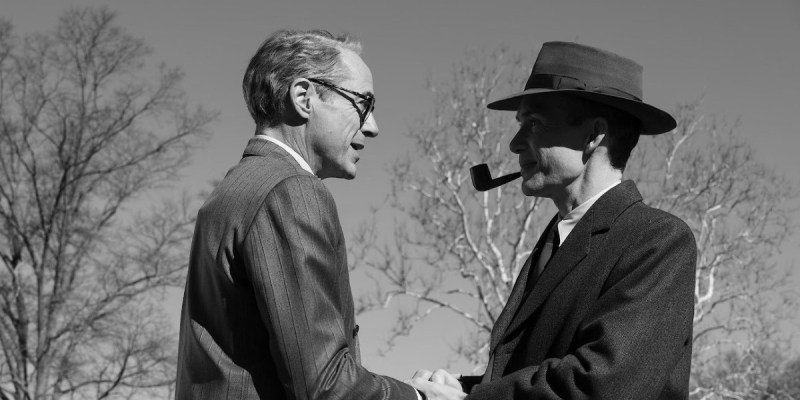Christopher Nolan’s latest movie, Oppenheimer, is finally in theaters and while it faces stiff competition from Greta Gerwig’s Barbie, by all accounts, Oppenheimer is simply fantastic. The film is a tense and surprisingly thrilling look at the life of J. Robert Oppenheimer and the saga surrounding the development and ramifications of the atomic bomb. Since there are a lot of ideas being thrown around throughout the movie, including seeds being planted early that are only resolved in the final scene, audiences may be wanting the ending of Oppenheimer and the final note the film leaves audiences on explained.
What Is The Meaning Of Oppenheimer’s Ending?
The final scene in the film is a flashback to one of its first scenes: a conversation between Oppenheimer and Albert Einstein, played by Cillian Murphy and Tom Conti respectively. When we first see this conversation, it is from the perspective of Robert Downey Jr’s Lewis Strauss, who was the head of the Atomic Energy Commission (AEC). As he approaches the other two men, Einstein sternly and grimly walks past Strauss, not saying a word or even acknowledging him. Strauss did not know what was said, but he had a few ideas of what they may have talked about.
Strauss expresses privately during his cabinet position hearing that he believed Oppenheimer said something to Einstein to sour Einstein’s opinion of Strauss. Strauss always believed that Oppenheimer had a grudge against him due to a sleight made against him at a public hearing that made Strauss look like an idiot. With his colleague Einstein coldly brushing past him, Strauss assumed the worst and began to plot Oppenheimer’s downfall. Strauss devoted his efforts to discrediting Oppenheimer’s name, revoking Oppenheimer’s security clearance status, and making sure Oppenheimer would never have a platform to express his opinions again. All because of what he thought the two men talked about.
The truth, however, has nothing to do with Strauss. Strauss wasn’t even brought up in the conversation. The final scene of the movie shows us the conversation, which was a continuation of the few discussions Oppenheimer had with Einstein previously about the nature and danger of atomic energy. When Oppenheimer first approached Einstein during the development of the atomic bomb, he asked for Einstein’s guidance and advice, which Einstein offered, warning Oppenheimer that if used, the atomic bomb could theoretically set off a chain reaction that would ignite the Earth’s atmosphere and kill all life on Earth. Now, as older men and with the bomb having been successfully detonated, Oppenheimer reaches out to Einstein once more.
The conversation that Strauss witnesses at the pond is, in reality, a pleasant one. The two men are cordial to each other and reflect on what Oppenheimer did, with Oppenheimer expressing his fears to Einstein. No, the explosion didn’t spark a chain reaction that ignited the Earth’s atmosphere, something that Einstein chuckles at. However, Oppenheimer tells Einstein that that chain reaction still happened as countries like the United States and the Soviet Union are producing and stockpiling atomic bombs to use against one another.
No matter what Oppenheimer does (or anyone else, for that matter), the events set in motion will lead to nuclear armageddon. It’s at this revelation that Einstein grimly walks away from Oppenheimer, leaving a sobering reminder that the genie can’t be put back in the bottle, with Oppenheimer staring from a fighter jet cockpit as several nuclear warheads fly overhead, hitting their targets and causing mass destruction and a countless loss of life.
It’s a dark note to end the film on, but a poignant reminder that nuclear war is still a possibility in our world today. All it takes is one missile to go off once again and the world will never be the same again.
